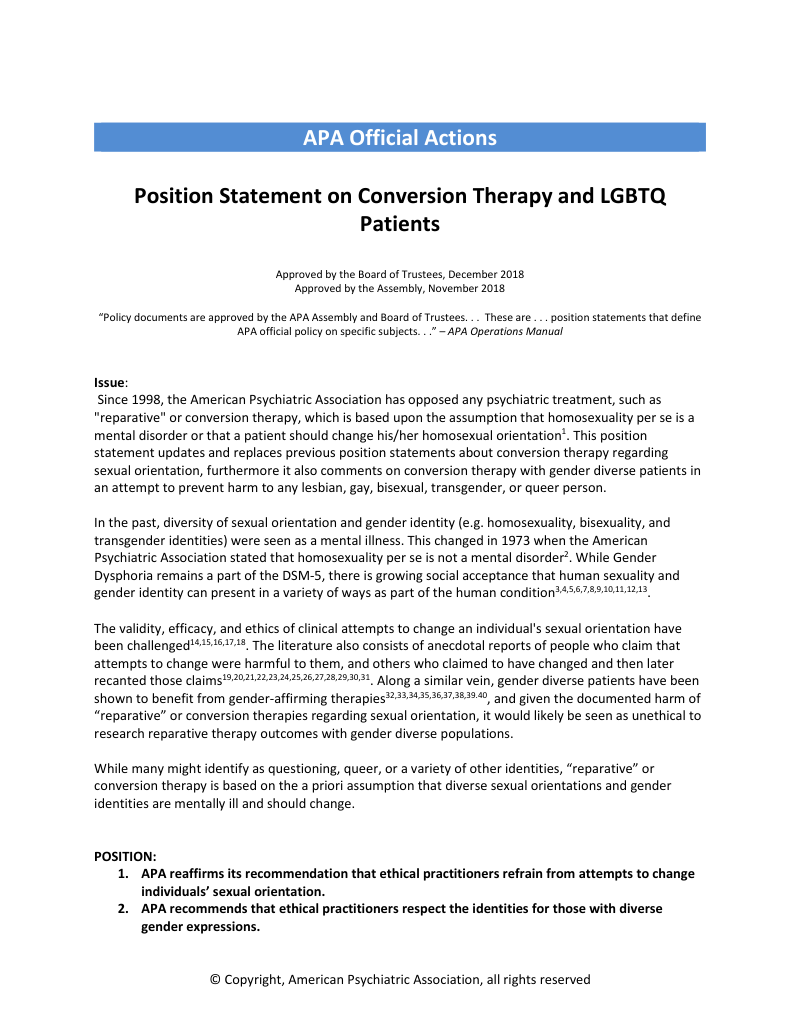American Psychiatric Association official position statement "encourages legislation which would prohibit" on "Conversion Therapy."
- Type
- Academic / Technical Report
- Source
- American Psychiatric Association Non-LDS
- Hearsay
- Direct
- Reference
"Position Statement on Conversion Therapy and LGBTQ Patients," APA Official Actions, American Psychiatric Association, December 2018
- Scribe/Publisher
- American Psychiatric Association
- People
- American Psychiatric Association
- Audience
- N/A
- Transcription
APA Official Actions
Position Statement on Conversion Therapy and LGBTQ Patients
. . .
Issue:
Since 1998, the American Psychiatric Association has opposed any psychiatric treatment, such as "reparative" or conversion therapy, which is based upon the assumption that homosexuality per se is a mental disorder or that a patient should change his/her homosexual orientation1. This position statement updates and replaces previous position statements about conversion therapy regarding sexual orientation, furthermore it also comments on conversion therapy with gender diverse patients in an attempt to prevent harm to any lesbian, gay, bisexual, transgender, or queer person.
In the past, diversity of sexual orientation and gender identity (e.g. homosexuality, bisexuality, and transgender identities) were seen as a mental illness. This changed in 1973 when the American Psychiatric Association stated that homosexuality per se is not a mental disorder2. While Gender Dysphoria remains a part of the DSM-5, there is growing social acceptance that human sexuality and gender identity can present in a variety of ways as part of the human condition 3,4,5,6,7,8,9,10,11,12,13.
The validity, efficacy, and ethics of clinical attempts to change an individual's sexual orientation have been challenged14,15,16,17,18. The literature also consists of anecdotal reports of people who claim that attempts to change were harmful to them, and others who claimed to have changed and then later recanted those claims 19,20,21,22,23,24,25,26,27,28,29,30,31. Along a similar vein, gender diverse patients have been shown to benefit from gender-affirming therapies32,33,34,35,36,37,38,39.40, and given the documented harm of “reparative” or conversion therapies regarding sexual orientation, it would likely be seen as unethical to research reparative therapy outcomes with gender diverse populations.
While many might identify as questioning, queer, or a variety of other identities, “reparative” or conversion therapy is based on the a priori assumption that diverse sexual orientations and gender identities are mentally ill and should change.
POSITION:
1. APA reaffirms its recommendation that ethical practitioners refrain from attempts to change individuals’ sexual orientation.
2. APA recommends that ethical practitioners respect the identities for those with diverse gender expressions.
3. APA encourages psychotherapies which affirm individuals’ sexual orientations and gender identities.
4. APA encourages legislation which would prohibit the practice of “reparative” or conversion therapies that are based on the a priori assumption that diverse sexual orientations and gender identities are mentally ill.
- Citations in Mormonr Qnas
The B. H. Roberts Foundation is not owned by, operated by, or affiliated with the Church of Jesus Christ of Latter-day Saints.

